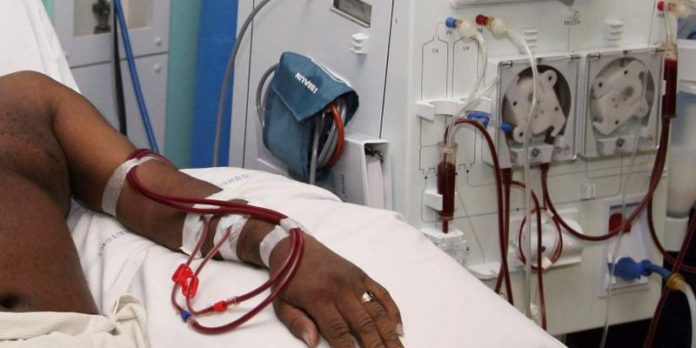In Ghana, the plight of individuals battling kidney disease has become a heartbreaking reality.
The extreme cost of dialysis, coupled with inadequate healthcare infrastructure, has left patients feeling hopeless and resigned to a tragic fate.
Kidney disease is a serious and long-lasting illness that is becoming a significant problem in Ghana, affecting many lives. But it is not just about the numbers. Patients face many difficulties every day, including physical pain, emotional struggles, and financial troubles.
Kidney disease sneaks up quietly, often presenting as tiredness, swelling, or mild pain. By the time you notice something is wrong, it might be too late, as is the case for many kidney patients.
Ghana’s healthcare system lacks resources, and many people are unaware of kidney disease, leading to patients often going undiagnosed and untreated until the disease reaches its end stage.
Health reports reveal that approximately 13.3% of the Ghanaian population suffers from chronic kidney disease (CKD), meaning hundreds of thousands of Ghanaians are affected. The problem is worse among people with high blood pressure and diabetes, with 1 in 6 (16.9%) suffering from kidney disease.
Even more alarming, 14-15% of homeless and slum dwellers in Accra have kidney problems. Many of these individuals don’t receive the help they need due to lack of access to healthcare, poverty, and other challenges. Overall, kidney disease is a significant health concern in Ghana.
Ghana’s renal care infrastructure is woefully inadequate, with only a handful of specialized centers, mostly located in urban areas, making it even more difficult for those in rural areas. The financial burden of dialysis is crippling, costing GH¢500-1,000 per session, and these patients are expected to repeat these sessions two to three times every week.
Countless individuals, ravaged by this illness, are compelled to plead for assistance with tears streaming down their faces, hoping for a chance to cheat death and continue living. Tragically, the outcome is not always certain.
For some, the cries for help are answered, and they receive the vital support they need to reclaim their fragile grip on life. However, for others, the response comes too late. Silently, they slip into eternity, leaving their families shattered and their dreams unfulfilled—the abrupt end to promising lives.
The government, healthcare providers, and international organizations must prioritize renal care and address the financial burden. Subsidizing dialysis costs or providing free treatment for vulnerable patients could alleviate suffering.
Establishing more renal care centers, particularly in rural areas, would improve access. Implementing health insurance programs that cover kidney disease treatment and encouraging public-private partnerships to improve healthcare infrastructure are crucial steps.
Recently, the government unveiled an initiative to provide free dialysis starting December 1, 2024. This program seeks to alleviate the financial strain on kidney patients, offering relief and hope to those struggling with the economic burden of renal care.
This initiative has received a lukewarm response from the public. On one hand, some people are thrilled, commending the government for its efforts to alleviate the financial burden on kidney patients. On the other hand, others believe this move is merely a political stunt, aimed at garnering votes with the December polls just around the corner.
The skepticism is understandable, given the timing of the announcement. With elections looming, it is natural to question the motivations behind such a significant policy change. However, it’s also important to consider the potential benefits of this initiative, which could bring relief to countless individuals struggling with kidney disease.
Ultimately, the true intentions behind this initiative will unfold in time. For now, it’s crucial to acknowledge both perspectives. For the love of humanity, we hope and pray that our leaders will not add this very crucial problem to the litany of other issues exploited for political gain. Every delayed decision leaves lives hanging precariously in the balance.
Ghana’s kidney patients are crying out for help. By implementing solutions and increasing awareness, we can alleviate suffering, restore hope, and ensure these individuals receive the care they deserve. May our leaders prioritize the well-being of humanity and address this critical issue with sincerity, rather than exploiting it for political gain.

